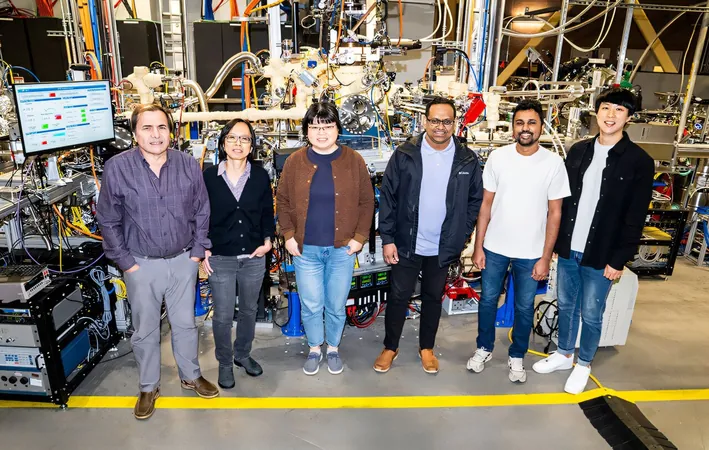
Revolutionary Inexpensive Catalyst Promises to Transform Methane Emissions into Useful Fuels at Room Temperature!
2024-11-21
Author: Sarah
Introduction
In a groundbreaking development for environmental sustainability, researchers have unveiled a game-changing catalyst that can effectively recycle methane emissions at or near room temperature. This innovative technology could significantly curb one of the leading sources of greenhouse gas emissions linked to natural gas usage across the United States, where methane is a primary component.
Natural gas is widely relied upon for heating, cooking, and generating electricity. However, its methane content makes it a major contributor to climate change, resulting in urgent calls for solutions to mitigate these emissions. In response, an interdisciplinary research team from the U.S. Department of Energy’s (DOE) Brookhaven National Laboratory has created a low-cost and efficient catalyst poised to revolutionize the way we handle methane.
Catalyst Development
Leaded by chemist Arephin Islam, the research is prominently featured on the cover of the journal *ACS Nano*. "Our catalyst can achieve methane conversion without requiring extreme temperatures, which sets it apart from many existing options," Islam stated. Traditional catalysts often demand high temperatures exceeding 500 K (around 440°F), making them less suitable for widespread adoption.
The new catalytic material consists of magnesium oxide nanoparticles—measuring just half a billionth of a meter in diameter—layered with copper oxide and placed atop a copper substrate. This unique composition enhances magnesium oxide’s performance in converting methane, particularly when combined with copper, which has known catalytic properties.
Research Validation
Guided by previous theoretical studies conducted by Brookhaven chemists Ping Liu and Erwei Huang, the team was able to validate that integrating nanostructured magnesium oxide with copper oxide could successfully facilitate methane conversion at moderate temperatures. Their investigation utilized advanced methods such as ambient-pressure X-ray photoelectron spectroscopy (AP-XPS) and scanning tunneling microscopy (STM) to study the catalyst’s behavior and effectiveness in real-time.
Findings and Implications
The findings were impressive: the catalyst activates methane at room temperature, breaking carbon-hydrogen bonds and converting it into ethane—valuable for a variety of commercial applications, including refrigerants and fuel production. Remarkably, its performance rivals high-cost alternatives based on precious metals like platinum and palladium, placing it on a more accessible scale for industrial use.
But the potential of this catalyst doesn’t stop at methane. Brookhaven researchers have also discovered its capability to convert carbon dioxide, another formidable greenhouse gas, into useful carbon monoxide and other derivatives at room temperature. These findings mark a promising stride toward finding sustainable solutions for controlling greenhouse gas emissions.
Conclusion
"This research represents a crucial advancement in our efforts toward sustainable conversion of potent greenhouse gases into useful products while addressing carbon mitigation strategies," said Islam. The development of this inexpensive catalyst not only paves the way for innovative recycling methods but also presents a critical opportunity to tackle climate change head-on.
Stay tuned as this story unfolds and the implications of this research reach industries and communities worldwide!

 Brasil (PT)
Brasil (PT)
 Canada (EN)
Canada (EN)
 Chile (ES)
Chile (ES)
 España (ES)
España (ES)
 France (FR)
France (FR)
 Hong Kong (EN)
Hong Kong (EN)
 Italia (IT)
Italia (IT)
 日本 (JA)
日本 (JA)
 Magyarország (HU)
Magyarország (HU)
 Norge (NO)
Norge (NO)
 Polska (PL)
Polska (PL)
 Schweiz (DE)
Schweiz (DE)
 Singapore (EN)
Singapore (EN)
 Sverige (SV)
Sverige (SV)
 Suomi (FI)
Suomi (FI)
 Türkiye (TR)
Türkiye (TR)